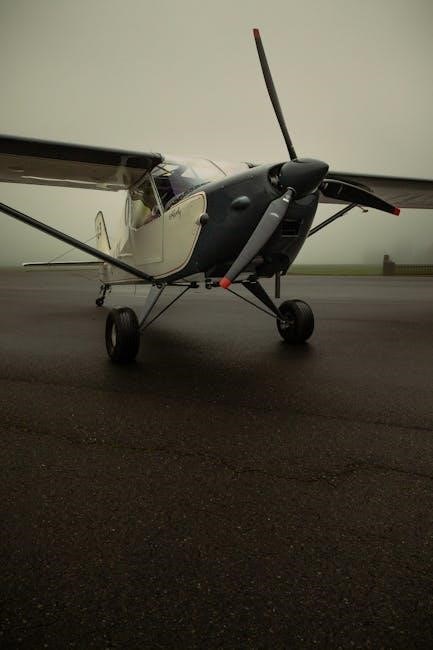The private pilot oral exam is a critical milestone, assessing aeronautical knowledge and practical application. It requires thorough preparation, covering aircraft systems, regulations, and emergency procedures to ensure safety and competence.

Understanding the Oral Exam
The oral exam is a face-to-face assessment where the examiner evaluates your knowledge and understanding of aviation concepts. It focuses on practical application, ensuring you can think critically and communicate effectively.
Structure and Format
The private pilot oral exam typically begins with an introduction, followed by a series of questions covering various aviation topics. The examiner starts with basic questions to assess foundational knowledge, gradually increasing difficulty. Questions are often scenario-based, requiring applicants to apply knowledge to real-world situations. The format includes a review of aircraft systems, weather interpretation, flight planning, and regulations. Applicants may reference materials like the FAR/AIM during the exam but should be well-organized for quick access. The exam concludes with a summary of key points, allowing the applicant to address any gaps in their responses. Proper preparation involves understanding the structure and practicing mock interviews to build confidence and clarity in communication.
Purpose and Importance
The private pilot oral exam evaluates a candidate’s understanding of aviation concepts, ensuring they can apply knowledge effectively in real-world scenarios. Its primary purpose is to assess a pilot’s ability to communicate clearly, make informed decisions, and demonstrate practical skills. This exam is crucial for verifying that pilots can operate safely and efficiently, adhering to regulations and best practices. By testing both knowledge and judgment, the oral exam prepares pilots for the challenges of flight, fostering confidence and readiness; It also provides an opportunity for examiners to clarify any misunderstandings and ensure the candidate is fully prepared for the responsibilities of flying. Passing the oral exam is a significant milestone, confirming a pilot’s competence and readiness for the practical test.
Preparation Strategies
Effective preparation involves studying the FAA ACS, using oral exam guides, practicing mock interviews, and organizing study materials to ensure comprehensive knowledge and confidence during the exam.
Studying the FAA ACS
The FAA Airman Certification Standards (ACS) outlines the knowledge and skills required for the private pilot exam. It provides detailed expectations for each topic, ensuring a structured approach to preparation. By focusing on areas like aircraft systems, weather, and regulations, pilots can identify weaknesses and strengthen their understanding. Highlighting and tabbing key sections in the ACS helps in quick reference during study sessions. Regular review ensures familiarity with the material, reducing exam day anxiety. Pilots should also practice explaining concepts aloud, as the oral exam evaluates both knowledge and communication skills. Utilizing the ACS as a primary resource ensures alignment with examiner expectations, enhancing overall readiness for the checkride.
Using Oral Exam Guides
Oral exam guides are invaluable resources for preparing for the private pilot oral exam. These guides compile common questions and answers, providing insight into what examiners typically ask. They cover a wide range of topics, from aircraft systems to regulations, helping candidates anticipate and practice responses. Many guides include sample questions and scenarios, allowing pilots to simulate the exam experience. By studying these materials, candidates can identify gaps in their knowledge and focus on areas that need improvement. Additionally, oral exam guides often offer tips for effective communication and strategies for staying calm under pressure. They serve as a practical supplement to the FAA ACS, helping pilots feel more confident and prepared for the actual exam. Regular review of these guides ensures a thorough understanding of key concepts and enhances readiness for the checkride.
Practicing Mock Interviews
Mock interviews are an essential tool for preparing for the private pilot oral exam. They simulate real-life scenarios, helping candidates become comfortable with the format and pressure of the actual test. By practicing with a certified flight instructor or experienced pilot, candidates can receive feedback on their responses and communication skills. Mock interviews also help identify knowledge gaps, allowing for targeted study. Additionally, they improve confidence and reduce anxiety, ensuring candidates are mentally prepared. Regular mock interviews provide a realistic environment to practice articulating answers clearly and concisely, which is crucial for success in the oral exam. They are a key component of a comprehensive study plan, enabling candidates to refine their skills and approach the exam with assurance and readiness.
Organizing Study Materials
Organizing study materials is crucial for effective preparation for the private pilot oral exam. Start by gathering essential resources such as the FAA ACS, FAR/AIM, and oral exam guides. Highlight and tab key sections to quickly reference important topics like aircraft systems, weather, and regulations. Create flashcards for complex concepts to aid memorization. Develop a binder or digital folder with separate sections for each exam category, ensuring easy access during study sessions. Regularly review and update your materials to stay current with aviation regulations and best practices. A well-organized system reduces stress and saves time, allowing you to focus on understanding and retaining critical information. By maintaining a structured approach, you can efficiently prepare for the oral exam and present your knowledge confidently to the examiner.
Key Areas of Questioning

The oral exam focuses on aircraft systems, weather, regulations, navigation, emergency procedures, and aerodynamics. Understanding these areas ensures a comprehensive grasp of aviation principles and practical applications.
Aircraft Systems
Aircraft systems are a fundamental area of questioning during the oral exam. Examiners often inquire about engine operation, electrical systems, fuel management, and hydraulic components. Understanding how these systems function under normal and emergency conditions is crucial. Common questions include explaining the purpose of the oil temperature gauge, the function of the alternator, and how fuel flow is regulated. Additionally, knowledge of aircraft instruments, such as the altimeter and tachometer, is essential. The FAR/AIM often serves as a reference for these topics. Being able to describe system malfunctions and troubleshooting procedures demonstrates a practical understanding. Familiarity with the ATOMATOFLAMES acronym (Altimeter, Tachometer, Oil temperature, etc.) can help organize your knowledge. This section tests your ability to operate and maintain the aircraft safely, making it a critical focus for preparation.
Weather and Flight Planning
Weather and flight planning are critical areas of focus during the oral exam, ensuring pilots can make informed, safe decisions. Examiners commonly ask about interpreting METARs, TAFs, and NOTAMs, as well as understanding weather risks like thunderstorms or icing. Knowledge of weather forecasting tools and their limitations is essential. Pilots must demonstrate the ability to plan cross-country flights, including selecting navigation charts, calculating fuel requirements, and identifying emergency landing sites. Familiarity with the FAR/AIM regulations regarding weather minimums and pre-flight briefings is vital. The FAA ACS emphasizes the importance of assessing weather conditions for flight safety. Be prepared to explain how weather impacts aircraft performance and navigation. Practicing with real-world scenarios and mock flight plans can enhance readiness. Understanding how to adjust plans based on changing weather conditions showcases a pilot’s ability to manage risks effectively. This section evaluates your ability to integrate weather analysis into practical flight operations.
Regulations and Legal Aspects
Understanding regulations and legal aspects is fundamental for private pilots, ensuring compliance with aviation laws and safe flight operations. Key topics include airspace classifications, flight restrictions, and medical requirements. Pilots must know their privileges and limitations under FAR Part 91. Examiners often ask about compliance with FAR/AIM, highlighting the importance of knowing when to consult these resources. This section assesses your understanding of legal responsibilities and adherence to federal aviation regulations. Familiarity with the FAA ACS is crucial, as it outlines expectations for legal knowledge. Non-compliance can lead to penalties or legal action, emphasizing the need to operate within established guidelines. This area evaluates your ability to navigate the legal framework governing private flight, ensuring you can make informed decisions that align with regulatory standards. Proper preparation helps in confidently addressing these critical aspects during the oral exam.
Navigation and Communication
Navigation and communication are vital skills for private pilots, ensuring safe and efficient flight operations. Pilots must understand how to use navigation aids like VOR, GPS, and landmarks to determine position and course. Communication involves proper radio etiquette, understanding ATC instructions, and emergency procedures. Examiners may ask about phraseology, frequencies, and protocols, emphasizing clear and concise communication. Knowledge of airspace classifications and navigation charts is also essential, as well as interpreting weather information for flight planning. Effective communication with ATC and other aircraft is critical for maintaining situational awareness and safety. This section tests your ability to apply navigation techniques and communicate effectively, ensuring you can operate confidently in various environments. Thorough preparation in these areas is crucial for a successful oral exam and safe flight operations.
Emergency Procedures
Emergency procedures are critical for ensuring pilot and passenger safety. The oral exam will assess your ability to recall and apply proper protocols for various scenarios, such as engine failure, system malfunctions, or medical emergencies. Be prepared to discuss steps for declaring an emergency, navigating to a safe location, and communicating with ATC. Understanding how to use emergency checklists and when to deviate from standard procedures is essential. Examiners may ask about scenarios like losing navigation instruments or experiencing a mechanical failure, requiring you to think critically. Familiarity with the POH and FAR/AIM is crucial, as they provide guidance for emergency situations. It’s important to stay calm and methodical, ensuring clear communication and adherence to safety protocols. Knowing when to ask for clarification or additional resources, such as consulting the POH or FAR/AIM during the exam, demonstrates preparedness and professionalism.
Aerodynamics and Aircraft Performance
Aerodynamics and aircraft performance are fundamental topics in the oral exam, focusing on understanding how an aircraft generates lift, thrust, and manages drag. You’ll need to explain concepts like Bernoulli’s principle, angle of attack, and stall speeds. Be prepared to discuss how aircraft performance factors such as weight, altitude, and airspeed impact takeoff, climb, and landing. Examiners may ask about the relationship between power and speed or how to optimize performance in various flight conditions. Understanding the aircraft’s POH specifications, such as maximum gross weight and fuel capacity, is critical. Additionally, you’ll need to describe how to interpret performance charts for takeoff and landing distances. This section tests your ability to apply theoretical knowledge to real-world scenarios, ensuring you can make informed decisions during flight. Familiarity with FAR/AIM regulations regarding performance limits is also essential for a thorough understanding.

Test-Taking Strategies
Stay calm, communicate clearly, and ask for clarification when needed. Organize your thoughts, answer confidently, and admit if unsure. Managing stress and thinking logically enhances performance and understanding.
Staying Calm and Confident

Staying calm and confident during the oral exam is crucial for success. Nervousness can impede clear thinking, so practicing relaxation techniques like deep breathing can help maintain composure. Visualizing success and positive outcomes also builds confidence. It’s important to remember that examiners aim to assess knowledge, not intimidate. Preparing thoroughly ensures familiarity with topics, reducing anxiety. Mock interviews and practice sessions with instructors can simulate exam conditions, helping candidates feel more at ease. Confidence comes from knowing the material well and understanding that it’s acceptable to pause or ask for clarification. A positive mindset and focus on communication rather than perfection are key to presenting answers clearly and effectively. Remember, confidence grows with preparation and practice, so stay focused and composed during the exam.
Effective Communication
Effective communication is vital during the oral exam, as it ensures clear articulation of your knowledge and understanding. Speaking clearly, maintaining a steady pace, and organizing your thoughts logically will help convey your answers confidently. Eye contact and positive body language also play a role in demonstrating assurance and professionalism. Engage with the examiner by asking clarifying questions if needed, showing active participation in the conversation. Honesty and transparency are key—admitting when you’re unsure of an answer and offering to look it up demonstrates integrity and a commitment to learning. Using notes or the FAR/AIM as a reference is acceptable and shows thorough preparation. Practicing mock interviews can refine your communication skills, helping you present information coherently under examination pressure. Remember, effective communication isn’t just about conveying information but also about engaging the examiner, which contributes to a positive and productive evaluation experience.
Knowing When to Ask for Clarification
Knowing when to ask for clarification is a crucial skill during the oral exam, as it ensures you fully understand the question before providing an answer. If the examiner’s question is unclear or overly broad, it’s important to seek more details to avoid misunderstandings. For example, you might ask, “Could you clarify what specific aspect of aircraft performance you’re referring to?” This demonstrates proactive engagement and a commitment to accuracy. Additionally, if the question touches on a complex topic, such as weather interpretations or regulatory nuances, asking for clarification can help you tailor your response effectively. Remember, it’s better to ask for clarification than to provide an incorrect or incomplete answer. Examiners appreciate candidates who take the initiative to ensure they understand the question fully. This approach not only enhances your performance but also shows confidence and professionalism.
Handling Difficult Questions
Handling difficult questions during the oral exam requires a combination of preparation, composure, and strategic thinking. When faced with a challenging query, remain calm and take a moment to organize your thoughts before responding. If unsure about the answer, it’s acceptable to acknowledge the complexity and explain your understanding based on your knowledge. For instance, you might say, “That’s a detailed topic, but from what I understand…” This approach demonstrates honesty and a willingness to engage with the material. Additionally, if the question references a specific regulation or procedure, referring to the FAR/AIM or other official resources can provide clarity. Practice addressing complex scenarios during mock interviews to build confidence in tackling tough questions. Remember, it’s not about knowing every answer but showing the ability to think critically and communicate effectively under pressure. This mindset will help you navigate even the most challenging aspects of the exam with professionalism.

Logistics and Etiquette
Ensure punctuality, bring required documents like your pilot’s logbook and FAR/AIM. Maintain professionalism and respect during the exam. Proper etiquette enhances your first impression and exam experience.
Documents to Bring
For the private pilot oral exam, it is essential to bring all required documents to ensure a smooth process. These include your pilot’s logbook, medical certificate, student pilot certificate, and a valid government-issued ID. Additionally, bring a copy of the FAR/AIM manual, aircraft-specific documents like the POH (Pilot’s Operating Handbook), and any other materials your instructor may have recommended. Organize these documents in a clear and accessible manner to demonstrate professionalism and preparedness. Ensuring you have all necessary paperwork ready avoids delays and shows respect for the examiner’s time. Double-check the list beforehand to confirm nothing is missing. Being well-organized not only aids in the logistics of the exam but also contributes to a positive first impression.
Examiner Expectations
During the private pilot oral exam, the examiner will assess your knowledge, confidence, and ability to apply what you’ve learned. They expect you to be well-prepared, organized, and able to answer questions clearly and concisely. Be ready to demonstrate a deep understanding of aircraft systems, regulations, and safety procedures. Examiners also evaluate your problem-solving skills and ability to think critically under pressure. Maintain a professional demeanor, and avoid guessing answers—instead, admit when you’re unsure and ask for clarification. Show enthusiasm and a willingness to learn, as this reflects your commitment to becoming a safe and competent pilot. Remember, the oral exam is not just about recalling facts but also about showcasing your ability to make sound judgments and communicate effectively. By meeting these expectations, you can create a positive impression and increase your chances of success.
Post-Exam Procedures
After completing the oral exam, the designated pilot examiner (DPE) will provide feedback on your performance. If you pass, they will issue a temporary airman certificate, which is valid for a specified period. You will then need to complete any remaining requirements, such as the practical flight test, to obtain your private pilot license. If you fail, the examiner will outline areas for improvement, and you may need to retake the exam after additional preparation. Regardless of the outcome, use the feedback to refine your knowledge and skills. After receiving your official certificate, ensure it is properly logged and stored. Celebrate your achievement, but remember to stay vigilant about ongoing training and adherence to aviation regulations. Post-exam procedures are crucial for finalizing your certification and ensuring compliance with FAA standards.

Additional Resources
Utilize FAA ACS guides, oral exam prep books, and online forums for comprehensive preparation. Flashcards and study apps can also aid in memorizing key terms and concepts effectively.
Recommended Study Materials
Essential resources include the FAA Airman Certification Standards (ACS) and oral exam guides, which outline common questions and answers. Flashcards, such as those from Quizlet, help memorize key aviation concepts. Additionally, books like the Private Pilot Oral Exam Guide by ASA provide detailed insights into examiner expectations. Online forums and communities, like those on Reddit or specialized aviation websites, offer real-world advice and tips from experienced pilots. Utilizing these materials ensures a well-rounded understanding of topics like aircraft systems, weather, and regulations. Consistent review and practice with these tools are crucial for confidence and success during the oral exam.
Online Forums and Communities
Online forums and aviation communities are invaluable resources for preparation. Platforms like Reddit’s aviation community, AOPA forums, and PilotEdge offer real-world insights and advice from experienced pilots. These spaces provide access to shared study strategies, common exam questions, and personal experiences. Many forums feature threads dedicated to the private pilot oral exam, where members discuss challenging topics and offer tips. Additionally, Facebook groups like “Private Pilot Study Group” and specialized aviation forums allow pilots to connect, ask questions, and learn from one another. These communities often include input from flight instructors and examiners, offering unique perspectives. Engaging with these online resources can help refine study strategies, address specific weaknesses, and gain confidence. They also serve as a support network, reducing anxiety and providing motivation throughout the preparation process.
Passing the private pilot oral exam requires a combination of thorough preparation, confidence, and effective communication. By understanding the structure, focusing on key areas, and practicing with mock interviews, candidates can navigate the process successfully. Leveraging resources like study guides, online forums, and instructor feedback is essential. Remember, the oral exam is not just about answering questions but demonstrating a deep understanding of aviation principles. Stay calm, organize your thoughts, and approach each question methodically. With dedication and the right strategies, aspiring pilots can confidently ace their oral exam and move closer to earning their private pilot license. This milestone is a testament to hard work and a commitment to aviation excellence, paving the way for a rewarding flying career.

